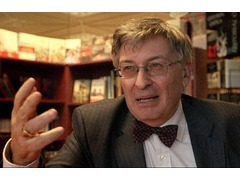European Commission
Documents from [1989] to [2004]Identity Statement
33 files
Carr, Mary
Content and Structure
At the end of his career in the Commission, Angel Viñas was among the privileged witnesses of the via cruces of the Santer Commission. As an historian, he analysed in his files the reasons, attributing the blame on institutional and organisational issues.
The nature of the Commission-Parliament relations in the first years of the Santer Team explains the genesis of the crisis: while the Maastricht Treaty reinforced the responsibilities of the Parliament, it affected the Commission head-on. The inter-governmental Conference which guided the Amsterdam Treaty did not give to the Commission new responsibilities nor new methods. The new processes of co-decision making, installed a direct line between the Council and Parliament, but the Commission took the risk of being short circuited. Jacques Santer suffered from a lack of legitimacy. Nominated President following the rejection by John Major of the candidature of Dehaene, his selection was barely approved by the Parliament when Pauline Green, President of the majority Socialist Group, declared: "This will not be a honeymoon for the Commission". The new President was immediately criticised for lack of vision: contrary to the Delors Commission, the new team did not take on any project that was capable of winning the enthusiasm of the public.
Furthermore, Santer did not make much progress on the project for the association of the Eastern Europe countries to the Community. True to his instructions "act less to act better" the principal concern of the new President was to put the house in order, to utilise better the resources at the disposition of the Community, where he had some success was in the initial reforms of the CAP. He concentrated on management, and neglected the political debate on institutional reform which was requested by the Assembly. This began a process of "de-politicisation" of the College, to the advantage of Directorates General.
The hesitancy which the Commission exhibited with regard to the "mad cow" crisis, led to further criticisms by the deputies for having given in to the pressure exerted on him by John Major, and in 1997 for the unfortunate attempt of Commissioner Leon Brittan in creating a "Free Trade North Atlantic Area" which divided the College and provoked a strong reaction from the French Government. A third problem was created by the desire of Santer to impose from above an important internal reform, articulated in three steps: the SEM 2000 (sound and efficient management), the MAP 2000 (Modernisation of Administration and Personal Policy) and lastly the DECODE exercise (Designing Tomorrow's Commission), which provoked significant internal conflict. The Commissioners who were directly responsible ignored the realities of the house which provoked a general strike of personnel on the 30 April 1997. The Commission had completely alientated its workers.
The problem of competent personnel was one of the reasons that led to the crisis in 1998: while the Commisson saw its programmes increased after Delors, the allowances for personnel didn't follow. To deal with this lack the Commission depended more on external assistance and agents. The second factor lay in the absence of financial control, which led to a number of complaints before or by the Commission of budget control of the Parliament (COCOBU): the expenses required for programmes such as PHARE, TACIS, aid to the Balkans or regional policy were particularly under scrutiny. Following the power struggle within the institution, it was the humanitarian aid agency ECHO which formed the object of the first direct attack against the Commission in the Spring of 1998. Created by Jacques Delors, the Agency which was directed by Gomez-Reino under the responsibility of Commissioner Marin and then by Emma Bonino, was the only organ which was placed at the disposal of the Commission to deal with the humanitarian crises in Bosnia and Central Africa. In 1997 criticism was levelled against the management of external personnel of ECHO by Perry-Lux agency. At the same time there filtered through, thanks to the indiscretions of an employee, Van Buitenen, the first allegations concerning presumed irregularities carried out by Edith Cresson, Commissioner for Education and Training, in the management of the "Leonardo" programme and the recruitment of her dentist as external advisor. To make matters worse, Helmut Kohl, principal supporter of Santer was beaten in 1998 in the German elections. The machine was put in motion, the Christian Democrat and Conservative Deputies saw the occasion to increase the role of control of the Parliament and denounced the alleged misappropriation of funds by some European employees and some socialist commissioners (Cresson, Marin and Bonino). The media after discovering the affair, particularly the Eurosceptic British tabloids, attacked the Commission and the Labour majority in the Parliament. With its reputation in jeopardy, the Parliament refused to give the budgetary "décharge" to the Commission. The latter made the error of declaring that it demanded that the EP clarify its position. On the 17 December 1998, by 270 (PPE, Liberals and Greens) against 225 (Social-democrats), the Parliament refused the "décharge" . The same result was witnessed once again on the 14 January 1999 by 293 votes against 232, the Commission had to accept the creation of a Committee of Independent Experts (professors of law and auditors) who were to investigate the alleged deficits. The report of this Committee revealed some fraud by some commissioners, and underlined the feeling of "non-answerability" on the part of the commissioners and criticised the loss of control of the Commission over its services, which led to the collective resignation of the Santer Commission on the 16 March 1999.
